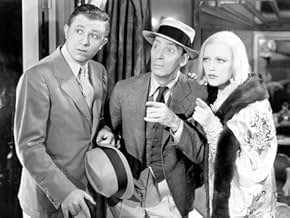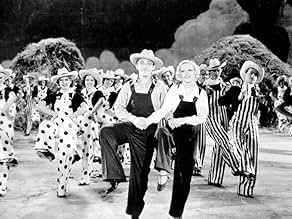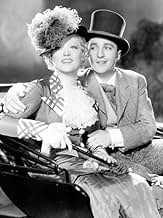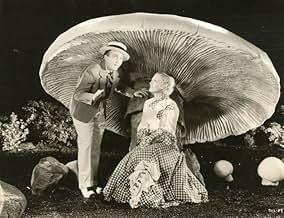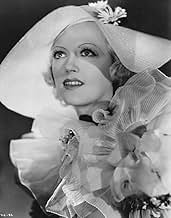VALUTAZIONE IMDb
6,1/10
1991
LA TUA VALUTAZIONE
Aggiungi una trama nella tua linguaA love-struck teacher pursues a radio singer to Hollywood.A love-struck teacher pursues a radio singer to Hollywood.A love-struck teacher pursues a radio singer to Hollywood.
- Regia
- Sceneggiatura
- Star
- Premi
- 3 vittorie e 1 candidatura in totale
The Radio Rogues
- The Radio Rogues
- (as Three Radio Rogues)
Sam Appel
- Mexican Bartender
- (non citato nei titoli originali)
Henry Armetta
- Henry Armetta
- (filmato d'archivio)
- (non citato nei titoli originali)
Eddie Bartell
- Member - Three Radio Rogues
- (non citato nei titoli originali)
Wallace Beery
- Wallace Beery - Premiere Clip
- (filmato d'archivio)
- (non citato nei titoli originali)
Clara Blandick
- Miss Perkins - Divinity Teacher
- (non citato nei titoli originali)
Harry Bowen
- Bartender
- (non citato nei titoli originali)
Nora Cecil
- Briarcroft's Teacher
- (non citato nei titoli originali)
Onest Conley
- Tap Dancer
- (non citato nei titoli originali)
Ken Darby
- Member - The King's Men
- (non citato nei titoli originali)
Jon Dodson
- Member - The King's Men
- (non citato nei titoli originali)
Recensioni in evidenza
This musical comedy features beautiful Marion as a bored French teacher who runs off to Hollywood. Seems like a standard 30s musical. But wait. The narrative structure of this film is more complex than it at first seems.
At a teachers' meeting at the Briarcroft School, one old maid complains that Davies (she teaches French) is always late because she spends too much time dreaming. They take her some papers to correct and find her.
When Davies turns on the radio and gazes out at the night sky she starts to wish upon a star. Just as she says "I wish I may, I wish I might...." Bing Crosby's voice cuts across the moment as he begins the lyric of "Our Big Love Scene": "Don't waste the night in wishing..." as though in answer to Davies' wish upon a star. She sits up, startled, and packs her bags.
So sets off not to go to Hollywood, but only to find Crosby, who plays a famous radio singer about to embark by train to Hollywood to star in a picture. Crosby is also involved with the picture's French star, played by Fifi D'Orsay. As Crosby is packing up to go, and after a live broadcast of his singing "Beautiful Girl" to Sterling Holloway, Davies finds him. He brushes her off as just another fan and heads to the Grand Central Station, where he sings "Going Hollywood."
On the train, who should show up but Davies. In today's context, Davies is certainly a crazed fan stalking her idol, but in 1933 her actions were (in the context of this film) acceptable. D'Orsay catches the two together (Davies is correcting Crosby's French pronunciation) and immediately suspects them of being up to something. D'Orsay is on the rampage because her maid has quit. Of course Davies becomes her maid, having taught French and all. The second time D'Orsay catches them together, she slaps Davies. Davies quits her job.
Next we find Davies in Hollywood at "Central Casting," asking to see Crosby. She's turned away and meets Patsy Kelly, a film extra. They hit it off right away, and Kelly invites Davies to share her digs. The director (Ned Sparks) walks by and hires them as extras in the film starring Crosby and D'Orsay.
At Kelly's bungalow, Davies takes a nap and has a bizarre dream about herself and Crosby starring in a surreal production number called "We'll Make Hay While the Sun Shines." While Davies dreams, we are shown a huge close up of her face, which is occasionally superimposed over the dream-scene action so that we don't forget it's all a dream. The scene opens with Crosby and Davies in a cozy cottage. Crosby starts the song, and the couple is strolling through a field of giant, swaying daisies and then sitting in a carriage where Davies joins Crosby in a brief duet. They come upon a farm scene of dancing scarecrows . Suddenly Davies emerges from the dancers and takes center stage in a dance lively number. But Crosby and Davies are still sitting in the carriage. Davies points to herself dancing and asks Crosby, "me?" He nods and soon he also is in the dance number. A windstorm suddenly comes up and everyone is drenched by the downpour. Crosby and Davies run back to the cozy cottage where they sit by the fire, wrapped in blankets, while Crosby finishes the song.
On the movie set, Davies once again finds Crosby. He's in between scenes when Davies approaches. She's in blackface and dressed like Aunt Jemima. He doesn't seem to notice that she is not really black. D'Orsay catches them again and slaps Davies for a second time.
Next we're on location and D'Orsay is about to sing her big number, "Cinderella's Fella." The number has a Cinderella theme with the blonde-wigged D'Orsay as the Prince. As she launches into the song, Sparks stops her and tells he she's doing it all wrong because she's doing it as a kooch dance. She throws a fit and storms off the set. Back in her trailer, Crosby tries to comfort her. Meanwhile, back on the set, the Radio Rogues do a series of impressions of current radio stars who include Kate Smith, Morton Downey, and Crosby's singing rival of the day-Russ Columbo.
Davies is then coaxed into doing an impression (Davies was famous for her ability to mimic, and does so in several of her films). Of course she launches into an impression of D'Orsay singing. D'Orsay hears this and marches out to catch Davies in mid-dance and hauls off and slaps her for a third time. This time Davies strikes back and delivers D'Orsay a black eye. D'Orsay quits and Davies is hired to star in the film! Talk about your Hollywood dream!
There is an abbreviated scene, with Davies and Crosby dating, with Crosby singing the wonderful "After Sundown." Later, Davies attempts to deliver some flowers to Crosby, but standing in the hallway outside his door she hears D'Orsay talking to Crosby.
D'Orsay lures Crosby to a Mexican bar and plies him with drinks, knowing he will be fired from the picture after being absent for days. Davies tracks him down yet again and tries to get him back but he's drunk and can't think straight. This sets up the film's best number and another yet dream sequence. Crosby sings "Temptation" while sitting at the bar and drinking what looks like absinthe. As he sings we see huge close-ups of D'Orsay (to match the close-ups of Davies in the previous dream sequence) and cutaway shots of a dance floor crowded with same-sex couples. In the bar itself, no one is dancing. As Crosby approaches the last notes of the song, he lifts his glass and drains the last drops. It's an amazing sequence.
The scene shifts back to the film set where, after seeing a dance montage to "Cinderella's Fella," Davies is about to film an elaborate production number, be-gowned in a massive ermine and sequin outfit. As she is about to begin the scene with Crosby's replacement, Bing can be heard reprising "Our Big Love Scene," and the lovers meet. End of film.
At a teachers' meeting at the Briarcroft School, one old maid complains that Davies (she teaches French) is always late because she spends too much time dreaming. They take her some papers to correct and find her.
When Davies turns on the radio and gazes out at the night sky she starts to wish upon a star. Just as she says "I wish I may, I wish I might...." Bing Crosby's voice cuts across the moment as he begins the lyric of "Our Big Love Scene": "Don't waste the night in wishing..." as though in answer to Davies' wish upon a star. She sits up, startled, and packs her bags.
So sets off not to go to Hollywood, but only to find Crosby, who plays a famous radio singer about to embark by train to Hollywood to star in a picture. Crosby is also involved with the picture's French star, played by Fifi D'Orsay. As Crosby is packing up to go, and after a live broadcast of his singing "Beautiful Girl" to Sterling Holloway, Davies finds him. He brushes her off as just another fan and heads to the Grand Central Station, where he sings "Going Hollywood."
On the train, who should show up but Davies. In today's context, Davies is certainly a crazed fan stalking her idol, but in 1933 her actions were (in the context of this film) acceptable. D'Orsay catches the two together (Davies is correcting Crosby's French pronunciation) and immediately suspects them of being up to something. D'Orsay is on the rampage because her maid has quit. Of course Davies becomes her maid, having taught French and all. The second time D'Orsay catches them together, she slaps Davies. Davies quits her job.
Next we find Davies in Hollywood at "Central Casting," asking to see Crosby. She's turned away and meets Patsy Kelly, a film extra. They hit it off right away, and Kelly invites Davies to share her digs. The director (Ned Sparks) walks by and hires them as extras in the film starring Crosby and D'Orsay.
At Kelly's bungalow, Davies takes a nap and has a bizarre dream about herself and Crosby starring in a surreal production number called "We'll Make Hay While the Sun Shines." While Davies dreams, we are shown a huge close up of her face, which is occasionally superimposed over the dream-scene action so that we don't forget it's all a dream. The scene opens with Crosby and Davies in a cozy cottage. Crosby starts the song, and the couple is strolling through a field of giant, swaying daisies and then sitting in a carriage where Davies joins Crosby in a brief duet. They come upon a farm scene of dancing scarecrows . Suddenly Davies emerges from the dancers and takes center stage in a dance lively number. But Crosby and Davies are still sitting in the carriage. Davies points to herself dancing and asks Crosby, "me?" He nods and soon he also is in the dance number. A windstorm suddenly comes up and everyone is drenched by the downpour. Crosby and Davies run back to the cozy cottage where they sit by the fire, wrapped in blankets, while Crosby finishes the song.
On the movie set, Davies once again finds Crosby. He's in between scenes when Davies approaches. She's in blackface and dressed like Aunt Jemima. He doesn't seem to notice that she is not really black. D'Orsay catches them again and slaps Davies for a second time.
Next we're on location and D'Orsay is about to sing her big number, "Cinderella's Fella." The number has a Cinderella theme with the blonde-wigged D'Orsay as the Prince. As she launches into the song, Sparks stops her and tells he she's doing it all wrong because she's doing it as a kooch dance. She throws a fit and storms off the set. Back in her trailer, Crosby tries to comfort her. Meanwhile, back on the set, the Radio Rogues do a series of impressions of current radio stars who include Kate Smith, Morton Downey, and Crosby's singing rival of the day-Russ Columbo.
Davies is then coaxed into doing an impression (Davies was famous for her ability to mimic, and does so in several of her films). Of course she launches into an impression of D'Orsay singing. D'Orsay hears this and marches out to catch Davies in mid-dance and hauls off and slaps her for a third time. This time Davies strikes back and delivers D'Orsay a black eye. D'Orsay quits and Davies is hired to star in the film! Talk about your Hollywood dream!
There is an abbreviated scene, with Davies and Crosby dating, with Crosby singing the wonderful "After Sundown." Later, Davies attempts to deliver some flowers to Crosby, but standing in the hallway outside his door she hears D'Orsay talking to Crosby.
D'Orsay lures Crosby to a Mexican bar and plies him with drinks, knowing he will be fired from the picture after being absent for days. Davies tracks him down yet again and tries to get him back but he's drunk and can't think straight. This sets up the film's best number and another yet dream sequence. Crosby sings "Temptation" while sitting at the bar and drinking what looks like absinthe. As he sings we see huge close-ups of D'Orsay (to match the close-ups of Davies in the previous dream sequence) and cutaway shots of a dance floor crowded with same-sex couples. In the bar itself, no one is dancing. As Crosby approaches the last notes of the song, he lifts his glass and drains the last drops. It's an amazing sequence.
The scene shifts back to the film set where, after seeing a dance montage to "Cinderella's Fella," Davies is about to film an elaborate production number, be-gowned in a massive ermine and sequin outfit. As she is about to begin the scene with Crosby's replacement, Bing can be heard reprising "Our Big Love Scene," and the lovers meet. End of film.
Spirited young teacher leaves uptight girl's school for fame and fortune in Hollywood.
I tuned in to catch the legendary Marion Davies, WR Hearst's (Citizen Kane) favorite squeeze, and was generally impressed even though the movie is unexceptional. She's got some natural charisma, and can dance and act as well as most musical performers. So this is not a case of a rich Daddy Warbucks making a silk purse out of a no-talent.
The movie itself is expensively produced with a couple impressive dance numbers (e.g. the massed train station), plus a youthful Crosby crooning at his most tuneful. But except for the torchy Temptation, the selections themselves are pretty forgettable. Nonetheless, the many behind-the-scenes look at movie sets remains fascinating. At the same time, macho director Walsh and noir producer Wanger may seem odd choices for the production end of a musical, but this is still early in their respective careers.
Speaking of directors, Ned Sparks who plays the raspy director in the movie appears to have swallowed a lemon and followed it up with a load of sandpaper, providing much of the comedy relief, along with a young Patsy Kelly. But funnier than anyone without even trying is D'Orsay's cartoonish French siren. For cultural historians, there's the guy mimicking radio personalities of the day, making an informative and entertaining novelty act. But I can't help noticing a couple of Davies', shall we say, unusual costumes—one is so fancy, it looks like the crinoline is swallowing her, while the other resembles a big furry snow cone minus the snow. Good thing the rest of her wardrobe is 30's conventional.
All in all, it's a good glimpse back in time, even if the musical end lacks staying power.
I tuned in to catch the legendary Marion Davies, WR Hearst's (Citizen Kane) favorite squeeze, and was generally impressed even though the movie is unexceptional. She's got some natural charisma, and can dance and act as well as most musical performers. So this is not a case of a rich Daddy Warbucks making a silk purse out of a no-talent.
The movie itself is expensively produced with a couple impressive dance numbers (e.g. the massed train station), plus a youthful Crosby crooning at his most tuneful. But except for the torchy Temptation, the selections themselves are pretty forgettable. Nonetheless, the many behind-the-scenes look at movie sets remains fascinating. At the same time, macho director Walsh and noir producer Wanger may seem odd choices for the production end of a musical, but this is still early in their respective careers.
Speaking of directors, Ned Sparks who plays the raspy director in the movie appears to have swallowed a lemon and followed it up with a load of sandpaper, providing much of the comedy relief, along with a young Patsy Kelly. But funnier than anyone without even trying is D'Orsay's cartoonish French siren. For cultural historians, there's the guy mimicking radio personalities of the day, making an informative and entertaining novelty act. But I can't help noticing a couple of Davies', shall we say, unusual costumes—one is so fancy, it looks like the crinoline is swallowing her, while the other resembles a big furry snow cone minus the snow. Good thing the rest of her wardrobe is 30's conventional.
All in all, it's a good glimpse back in time, even if the musical end lacks staying power.
Bing Crosby truly was the quintessential vocalist of his time. I strongly recommend Gary Giddins bio on Bing; an excellent reference.
Anyway, the story may be weak in this film, but the songs and Bing's clear baritone voice make up for it.
An interesting tidbit about this film: Of course Marion Davies was W.R. Hearst's mistress, and Hearst financed the film. Ms. Davies thus took full advantage of the situation by showing up for filming at 10 AM, shooting a scene or two before a four hour lunch replete with all the catered trimmings and wines. The day wound down by 4PM.
It's no wonder it took six months to shoot this film in an era when the typical film was shot in 2 weeks!
Anyway, the story may be weak in this film, but the songs and Bing's clear baritone voice make up for it.
An interesting tidbit about this film: Of course Marion Davies was W.R. Hearst's mistress, and Hearst financed the film. Ms. Davies thus took full advantage of the situation by showing up for filming at 10 AM, shooting a scene or two before a four hour lunch replete with all the catered trimmings and wines. The day wound down by 4PM.
It's no wonder it took six months to shoot this film in an era when the typical film was shot in 2 weeks!
One of the other reviewers said that this film was essentially about stalking. I had never thought of it in those terms, but it's true.
Marion Davies is a love starved French teacher at a girl's boarding school who's spare hours are taken up with the radio crooning of Bing Crosby. She follows the object of her affection out to Hollywood and in Hollywood cliché style gets her big break in the movies.
First if you're willing to accept the beautiful Marion Davies with this crowd of old spinsters at the boarding school then the rest of the plot simply follows. Second for Bing Crosby fans one has to remember that this is NOT a Crosby picture. He's the leading man in a Marion Davies film. Everyone is familiar with William Randolph Hearst and the Svengali like influence he had on her career. Marion's making a musical so you go out and buy the hottest singer currently as her leading man. And that, boys and girls, is the story of Bing's first film away from Paramount.
You also hire a topflight director in Raoul Walsh to keep things at a brisk pace. And you give Marion a good supporting cast that includes Fifi D'Orsay, Ned Sparks, Stu Erwin, and Patsy Kelly. Mix 'em together and you got Going Hollywood.
It's not a bad mix. Crosby had a lot of songs in this film. The big hit was Temptation, but there were other good ones from Nacio Herb Brown and Arthur Freed. One thing however, since this was not Paramount and MGM was known for the great production numbers in their films, Bing got some great numbers. I'm surprised frankly that Hearst allowed Crosby a huge number like the title tune, set in Grand Central Station, without Davies in it. Davies does join him in a dream sequence where she sings a couple of lines of We'll Make Hay While The Sun Shines with Marion and Bing dressed as a pair of Grand Wood rustics. Another big production number that Paramount would never spend the money for.
Davies had good if limited talents. Hearst however could only see her as a pure heroine. Since he discovered her in the Ziegfeld Follies, Davies's dancing should be no surprise. It's at least as good as Ruby Keeler's. She had a good gift for mimicry, her imitation of Fifi D'Orsay is a key point in the plot. One thing that would be considered in god-awful taste now is her donning black-face to get on Bing's movie set and imitating the dialect.
It's funny though. Think about pictures like Play Misty For Me and The Fan made two generations later. Stalking was looked on entirely differently back in those more innocent days.
Marion Davies is a love starved French teacher at a girl's boarding school who's spare hours are taken up with the radio crooning of Bing Crosby. She follows the object of her affection out to Hollywood and in Hollywood cliché style gets her big break in the movies.
First if you're willing to accept the beautiful Marion Davies with this crowd of old spinsters at the boarding school then the rest of the plot simply follows. Second for Bing Crosby fans one has to remember that this is NOT a Crosby picture. He's the leading man in a Marion Davies film. Everyone is familiar with William Randolph Hearst and the Svengali like influence he had on her career. Marion's making a musical so you go out and buy the hottest singer currently as her leading man. And that, boys and girls, is the story of Bing's first film away from Paramount.
You also hire a topflight director in Raoul Walsh to keep things at a brisk pace. And you give Marion a good supporting cast that includes Fifi D'Orsay, Ned Sparks, Stu Erwin, and Patsy Kelly. Mix 'em together and you got Going Hollywood.
It's not a bad mix. Crosby had a lot of songs in this film. The big hit was Temptation, but there were other good ones from Nacio Herb Brown and Arthur Freed. One thing however, since this was not Paramount and MGM was known for the great production numbers in their films, Bing got some great numbers. I'm surprised frankly that Hearst allowed Crosby a huge number like the title tune, set in Grand Central Station, without Davies in it. Davies does join him in a dream sequence where she sings a couple of lines of We'll Make Hay While The Sun Shines with Marion and Bing dressed as a pair of Grand Wood rustics. Another big production number that Paramount would never spend the money for.
Davies had good if limited talents. Hearst however could only see her as a pure heroine. Since he discovered her in the Ziegfeld Follies, Davies's dancing should be no surprise. It's at least as good as Ruby Keeler's. She had a good gift for mimicry, her imitation of Fifi D'Orsay is a key point in the plot. One thing that would be considered in god-awful taste now is her donning black-face to get on Bing's movie set and imitating the dialect.
It's funny though. Think about pictures like Play Misty For Me and The Fan made two generations later. Stalking was looked on entirely differently back in those more innocent days.
I watched this movie because I wanted to see what Marion Davies could do in a comedy, which is supposedly what she did best. She was an attractive woman, with - at least on screen - a pleasant, unpretentious personality, so I figured she might indeed do well in comedy.
But this script, by the much admired David Ogden Stewart, gives her nothing to work with. She delivers her lines ok, but the lines are so uninteresting that I don't know what Helen Hayes could have done with them.
Davies has to dance, and she's passable but no better. But then, no worse than Crawford or some other actresses of the era who were given dance numbers. Davies has to sing, and again, she's not bad, but nothing special.
In short, this movie doesn't make a case for Davies as an actress in comedy. It doesn't make her look bad, but it doesn't make you think she was a great comedian, either.
For me, the best thing, the only really good thing, in this movie was Bing Crosby's delivery of some of his musical numbers, in particular *Temptation*, a great song that he brings off very well. The other musical numbers, like the script, are bland and forgettable.
I'm surprised that Hearst, with all his money and power, couldn't have seen to it that Davies had better material. But then, perhaps the problem was not with her but with him: maybe he couldn't tell if a movie script was good or bad and imposed bad ones on her.
But this script, by the much admired David Ogden Stewart, gives her nothing to work with. She delivers her lines ok, but the lines are so uninteresting that I don't know what Helen Hayes could have done with them.
Davies has to dance, and she's passable but no better. But then, no worse than Crawford or some other actresses of the era who were given dance numbers. Davies has to sing, and again, she's not bad, but nothing special.
In short, this movie doesn't make a case for Davies as an actress in comedy. It doesn't make her look bad, but it doesn't make you think she was a great comedian, either.
For me, the best thing, the only really good thing, in this movie was Bing Crosby's delivery of some of his musical numbers, in particular *Temptation*, a great song that he brings off very well. The other musical numbers, like the script, are bland and forgettable.
I'm surprised that Hearst, with all his money and power, couldn't have seen to it that Davies had better material. But then, perhaps the problem was not with her but with him: maybe he couldn't tell if a movie script was good or bad and imposed bad ones on her.
Lo sapevi?
- QuizWhen Marion Davies requested Bing Crosby as her leading man for this film, he was under contract to Paramount, where they had him starring in shorts and a series of college themed films with Jack Oakie. The success of this film moved Crosby into starring roles at Paramount with the likes of Carole Lombard and Miriam Hopkins, a definite step upwards.
- Citazioni
Bill 'Billy' Williams: [singing] Out where they say, "Let us be gay," I'm going Hollywood. I'll ballyhoo greetings to you, I'm going Hollywood. Hey, while you sleepyheads are in that hay, I'll be dancing - I'm gonna be dancing with a sun-kissed baby. And I'm on my way - here's my beret, I'm going Hollywood!
- ConnessioniEdited into The Big Idea (1934)
- Colonne sonoreGoing Hollywood
(1933) (uncredited)
Music by Nacio Herb Brown
Lyrics by Arthur Freed
Played during the opening credits
Sung by Bing Crosby at the railroad station
Played as background music twice
I più visti
Accedi per valutare e creare un elenco di titoli salvati per ottenere consigli personalizzati
Dettagli
- Data di uscita
- Paese di origine
- Sito ufficiale
- Lingue
- Celebre anche come
- Going Hollywood
- Luoghi delle riprese
- Aziende produttrici
- Vedi altri crediti dell’azienda su IMDbPro
Botteghino
- Budget
- 914.000 USD (previsto)
- Tempo di esecuzione1 ora 18 minuti
- Colore
- Proporzioni
- 1.37 : 1
Contribuisci a questa pagina
Suggerisci una modifica o aggiungi i contenuti mancanti

Divario superiore
By what name was Verso Hollywood (1933) officially released in India in English?
Rispondi
